Hospitality Business Strategy
VerifiedAdded on 2023/01/10
|12
|3773
|89
AI Summary
Contribute Materials
Your contribution can guide someone’s learning journey. Share your
documents today.
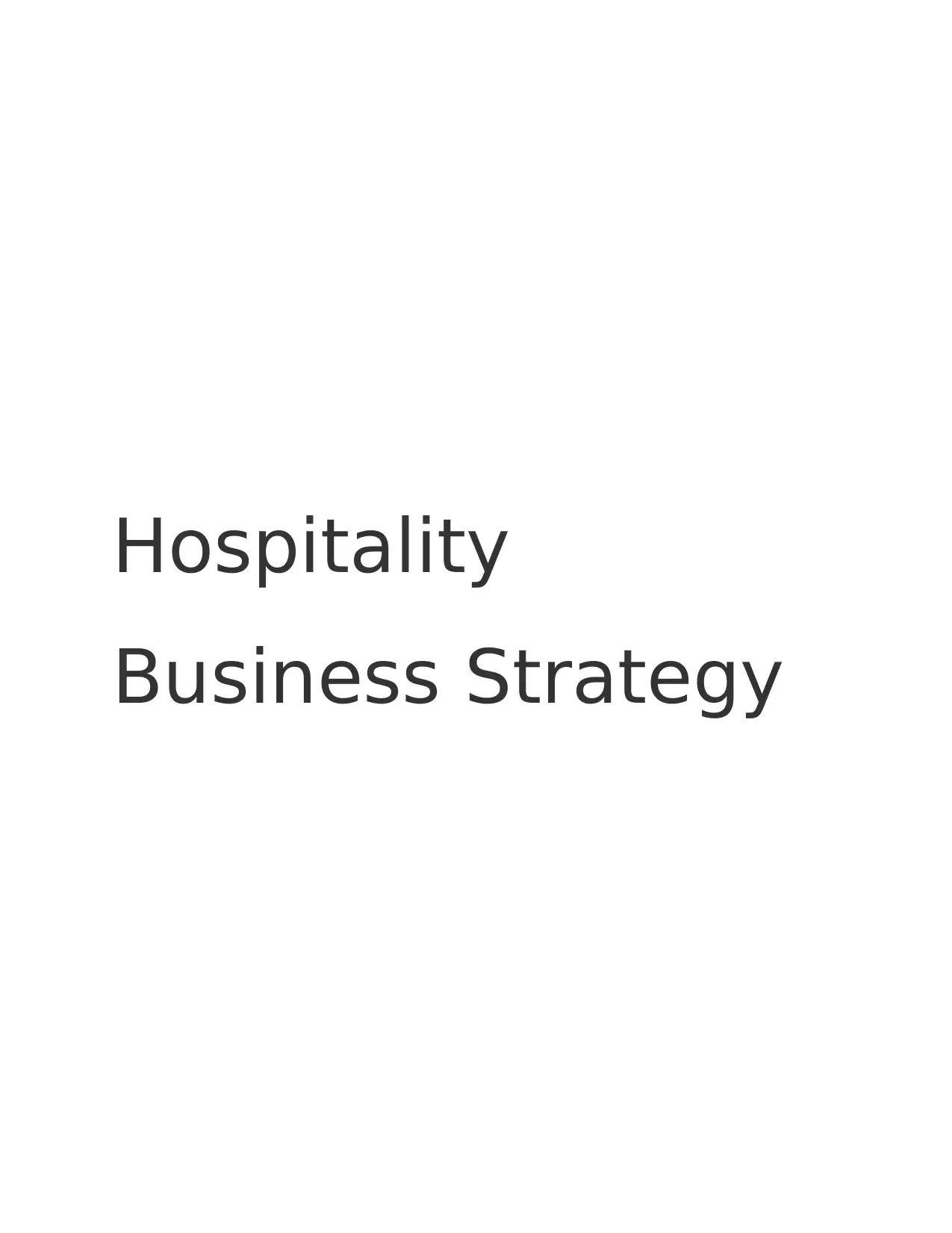
Hospitality
Business Strategy
Business Strategy
Secure Best Marks with AI Grader
Need help grading? Try our AI Grader for instant feedback on your assignments.
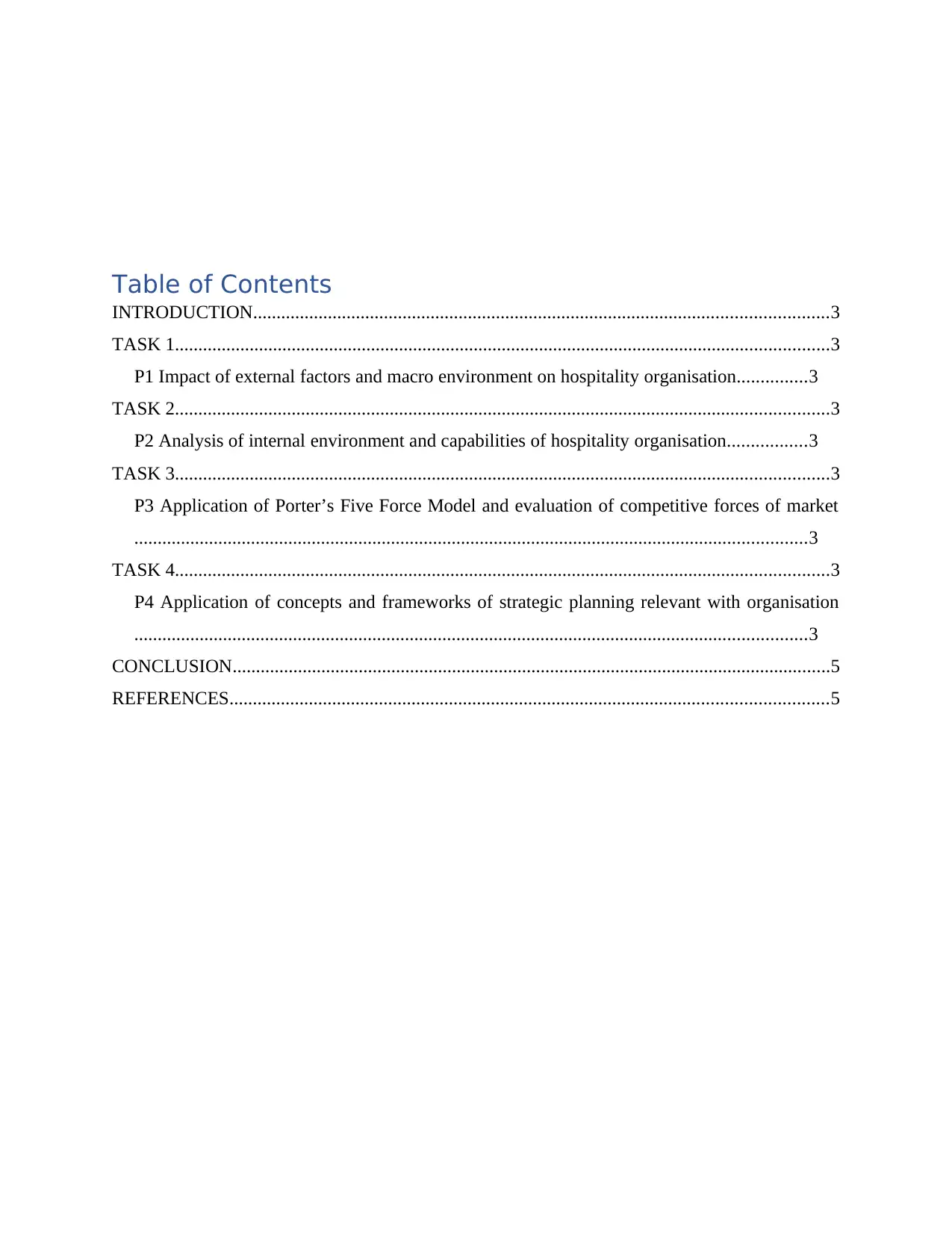
Table of Contents
INTRODUCTION...........................................................................................................................3
TASK 1............................................................................................................................................3
P1 Impact of external factors and macro environment on hospitality organisation...............3
TASK 2............................................................................................................................................3
P2 Analysis of internal environment and capabilities of hospitality organisation.................3
TASK 3............................................................................................................................................3
P3 Application of Porter’s Five Force Model and evaluation of competitive forces of market
................................................................................................................................................3
TASK 4............................................................................................................................................3
P4 Application of concepts and frameworks of strategic planning relevant with organisation
................................................................................................................................................3
CONCLUSION................................................................................................................................5
REFERENCES................................................................................................................................5
INTRODUCTION...........................................................................................................................3
TASK 1............................................................................................................................................3
P1 Impact of external factors and macro environment on hospitality organisation...............3
TASK 2............................................................................................................................................3
P2 Analysis of internal environment and capabilities of hospitality organisation.................3
TASK 3............................................................................................................................................3
P3 Application of Porter’s Five Force Model and evaluation of competitive forces of market
................................................................................................................................................3
TASK 4............................................................................................................................................3
P4 Application of concepts and frameworks of strategic planning relevant with organisation
................................................................................................................................................3
CONCLUSION................................................................................................................................5
REFERENCES................................................................................................................................5
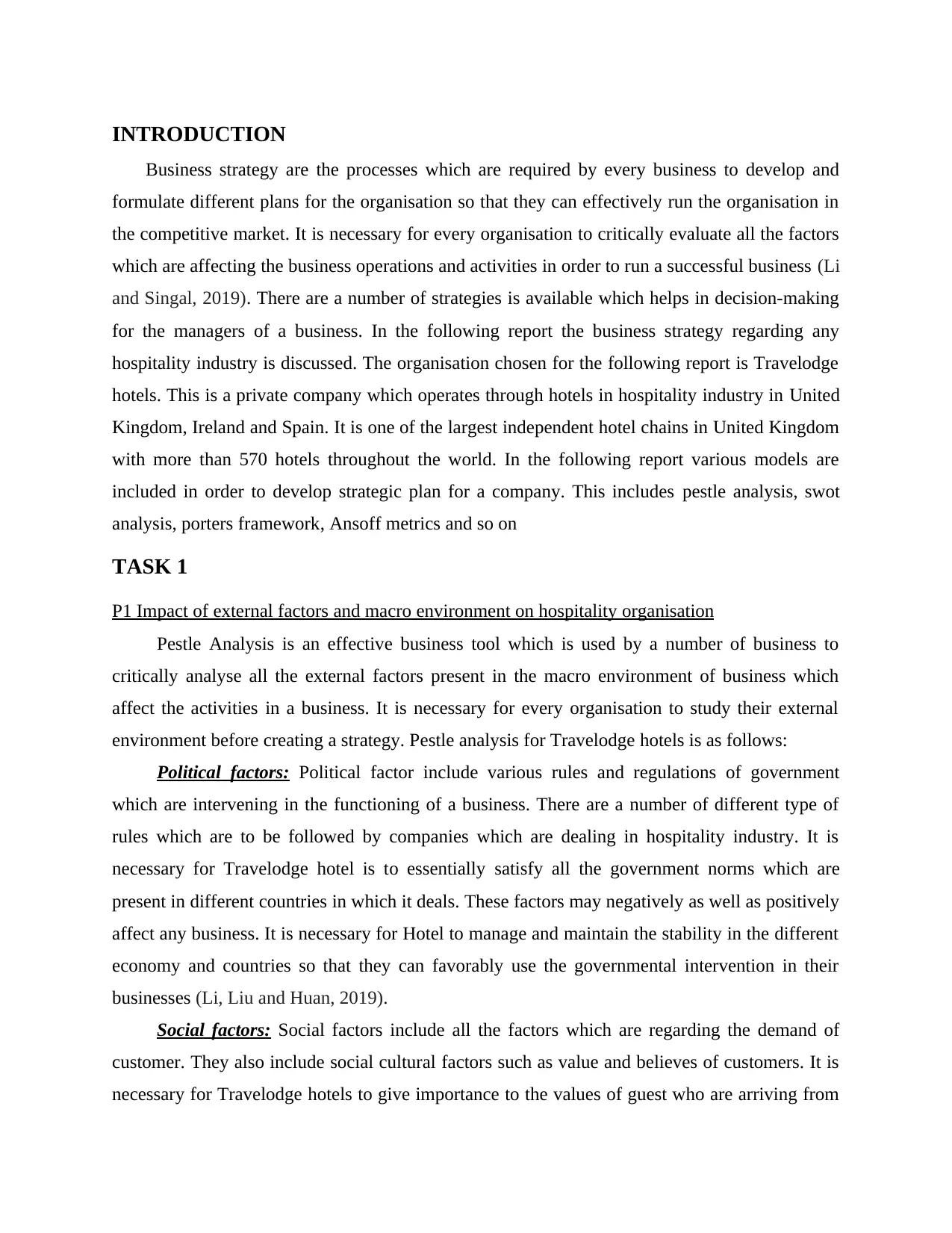
INTRODUCTION
Business strategy are the processes which are required by every business to develop and
formulate different plans for the organisation so that they can effectively run the organisation in
the competitive market. It is necessary for every organisation to critically evaluate all the factors
which are affecting the business operations and activities in order to run a successful business (Li
and Singal, 2019). There are a number of strategies is available which helps in decision-making
for the managers of a business. In the following report the business strategy regarding any
hospitality industry is discussed. The organisation chosen for the following report is Travelodge
hotels. This is a private company which operates through hotels in hospitality industry in United
Kingdom, Ireland and Spain. It is one of the largest independent hotel chains in United Kingdom
with more than 570 hotels throughout the world. In the following report various models are
included in order to develop strategic plan for a company. This includes pestle analysis, swot
analysis, porters framework, Ansoff metrics and so on
TASK 1
P1 Impact of external factors and macro environment on hospitality organisation
Pestle Analysis is an effective business tool which is used by a number of business to
critically analyse all the external factors present in the macro environment of business which
affect the activities in a business. It is necessary for every organisation to study their external
environment before creating a strategy. Pestle analysis for Travelodge hotels is as follows:
Political factors: Political factor include various rules and regulations of government
which are intervening in the functioning of a business. There are a number of different type of
rules which are to be followed by companies which are dealing in hospitality industry. It is
necessary for Travelodge hotel is to essentially satisfy all the government norms which are
present in different countries in which it deals. These factors may negatively as well as positively
affect any business. It is necessary for Hotel to manage and maintain the stability in the different
economy and countries so that they can favorably use the governmental intervention in their
businesses (Li, Liu and Huan, 2019).
Social factors: Social factors include all the factors which are regarding the demand of
customer. They also include social cultural factors such as value and believes of customers. It is
necessary for Travelodge hotels to give importance to the values of guest who are arriving from
Business strategy are the processes which are required by every business to develop and
formulate different plans for the organisation so that they can effectively run the organisation in
the competitive market. It is necessary for every organisation to critically evaluate all the factors
which are affecting the business operations and activities in order to run a successful business (Li
and Singal, 2019). There are a number of strategies is available which helps in decision-making
for the managers of a business. In the following report the business strategy regarding any
hospitality industry is discussed. The organisation chosen for the following report is Travelodge
hotels. This is a private company which operates through hotels in hospitality industry in United
Kingdom, Ireland and Spain. It is one of the largest independent hotel chains in United Kingdom
with more than 570 hotels throughout the world. In the following report various models are
included in order to develop strategic plan for a company. This includes pestle analysis, swot
analysis, porters framework, Ansoff metrics and so on
TASK 1
P1 Impact of external factors and macro environment on hospitality organisation
Pestle Analysis is an effective business tool which is used by a number of business to
critically analyse all the external factors present in the macro environment of business which
affect the activities in a business. It is necessary for every organisation to study their external
environment before creating a strategy. Pestle analysis for Travelodge hotels is as follows:
Political factors: Political factor include various rules and regulations of government
which are intervening in the functioning of a business. There are a number of different type of
rules which are to be followed by companies which are dealing in hospitality industry. It is
necessary for Travelodge hotel is to essentially satisfy all the government norms which are
present in different countries in which it deals. These factors may negatively as well as positively
affect any business. It is necessary for Hotel to manage and maintain the stability in the different
economy and countries so that they can favorably use the governmental intervention in their
businesses (Li, Liu and Huan, 2019).
Social factors: Social factors include all the factors which are regarding the demand of
customer. They also include social cultural factors such as value and believes of customers. It is
necessary for Travelodge hotels to give importance to the values of guest who are arriving from
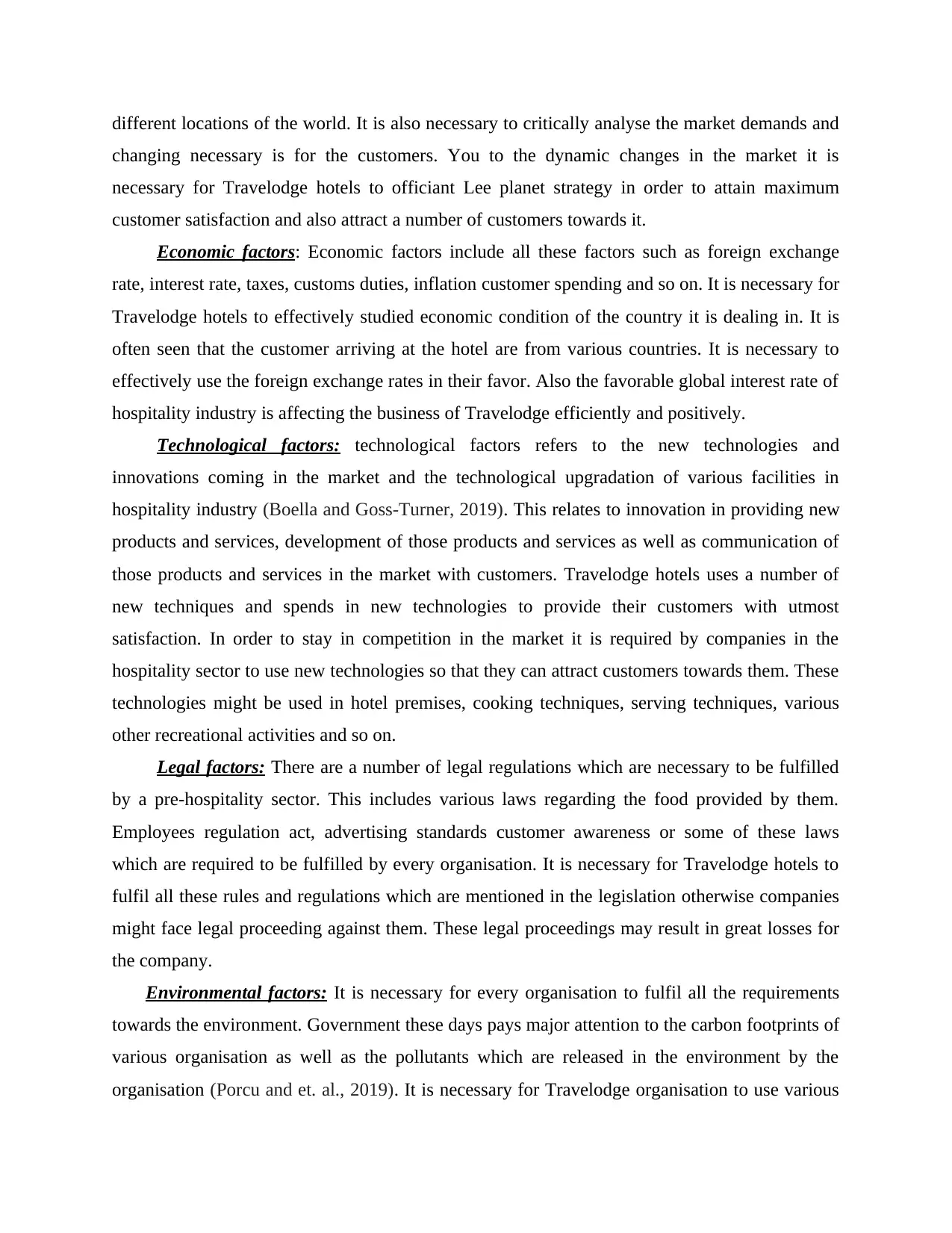
different locations of the world. It is also necessary to critically analyse the market demands and
changing necessary is for the customers. You to the dynamic changes in the market it is
necessary for Travelodge hotels to officiant Lee planet strategy in order to attain maximum
customer satisfaction and also attract a number of customers towards it.
Economic factors: Economic factors include all these factors such as foreign exchange
rate, interest rate, taxes, customs duties, inflation customer spending and so on. It is necessary for
Travelodge hotels to effectively studied economic condition of the country it is dealing in. It is
often seen that the customer arriving at the hotel are from various countries. It is necessary to
effectively use the foreign exchange rates in their favor. Also the favorable global interest rate of
hospitality industry is affecting the business of Travelodge efficiently and positively.
Technological factors: technological factors refers to the new technologies and
innovations coming in the market and the technological upgradation of various facilities in
hospitality industry (Boella and Goss-Turner, 2019). This relates to innovation in providing new
products and services, development of those products and services as well as communication of
those products and services in the market with customers. Travelodge hotels uses a number of
new techniques and spends in new technologies to provide their customers with utmost
satisfaction. In order to stay in competition in the market it is required by companies in the
hospitality sector to use new technologies so that they can attract customers towards them. These
technologies might be used in hotel premises, cooking techniques, serving techniques, various
other recreational activities and so on.
Legal factors: There are a number of legal regulations which are necessary to be fulfilled
by a pre-hospitality sector. This includes various laws regarding the food provided by them.
Employees regulation act, advertising standards customer awareness or some of these laws
which are required to be fulfilled by every organisation. It is necessary for Travelodge hotels to
fulfil all these rules and regulations which are mentioned in the legislation otherwise companies
might face legal proceeding against them. These legal proceedings may result in great losses for
the company.
Environmental factors: It is necessary for every organisation to fulfil all the requirements
towards the environment. Government these days pays major attention to the carbon footprints of
various organisation as well as the pollutants which are released in the environment by the
organisation (Porcu and et. al., 2019). It is necessary for Travelodge organisation to use various
changing necessary is for the customers. You to the dynamic changes in the market it is
necessary for Travelodge hotels to officiant Lee planet strategy in order to attain maximum
customer satisfaction and also attract a number of customers towards it.
Economic factors: Economic factors include all these factors such as foreign exchange
rate, interest rate, taxes, customs duties, inflation customer spending and so on. It is necessary for
Travelodge hotels to effectively studied economic condition of the country it is dealing in. It is
often seen that the customer arriving at the hotel are from various countries. It is necessary to
effectively use the foreign exchange rates in their favor. Also the favorable global interest rate of
hospitality industry is affecting the business of Travelodge efficiently and positively.
Technological factors: technological factors refers to the new technologies and
innovations coming in the market and the technological upgradation of various facilities in
hospitality industry (Boella and Goss-Turner, 2019). This relates to innovation in providing new
products and services, development of those products and services as well as communication of
those products and services in the market with customers. Travelodge hotels uses a number of
new techniques and spends in new technologies to provide their customers with utmost
satisfaction. In order to stay in competition in the market it is required by companies in the
hospitality sector to use new technologies so that they can attract customers towards them. These
technologies might be used in hotel premises, cooking techniques, serving techniques, various
other recreational activities and so on.
Legal factors: There are a number of legal regulations which are necessary to be fulfilled
by a pre-hospitality sector. This includes various laws regarding the food provided by them.
Employees regulation act, advertising standards customer awareness or some of these laws
which are required to be fulfilled by every organisation. It is necessary for Travelodge hotels to
fulfil all these rules and regulations which are mentioned in the legislation otherwise companies
might face legal proceeding against them. These legal proceedings may result in great losses for
the company.
Environmental factors: It is necessary for every organisation to fulfil all the requirements
towards the environment. Government these days pays major attention to the carbon footprints of
various organisation as well as the pollutants which are released in the environment by the
organisation (Porcu and et. al., 2019). It is necessary for Travelodge organisation to use various
Secure Best Marks with AI Grader
Need help grading? Try our AI Grader for instant feedback on your assignments.
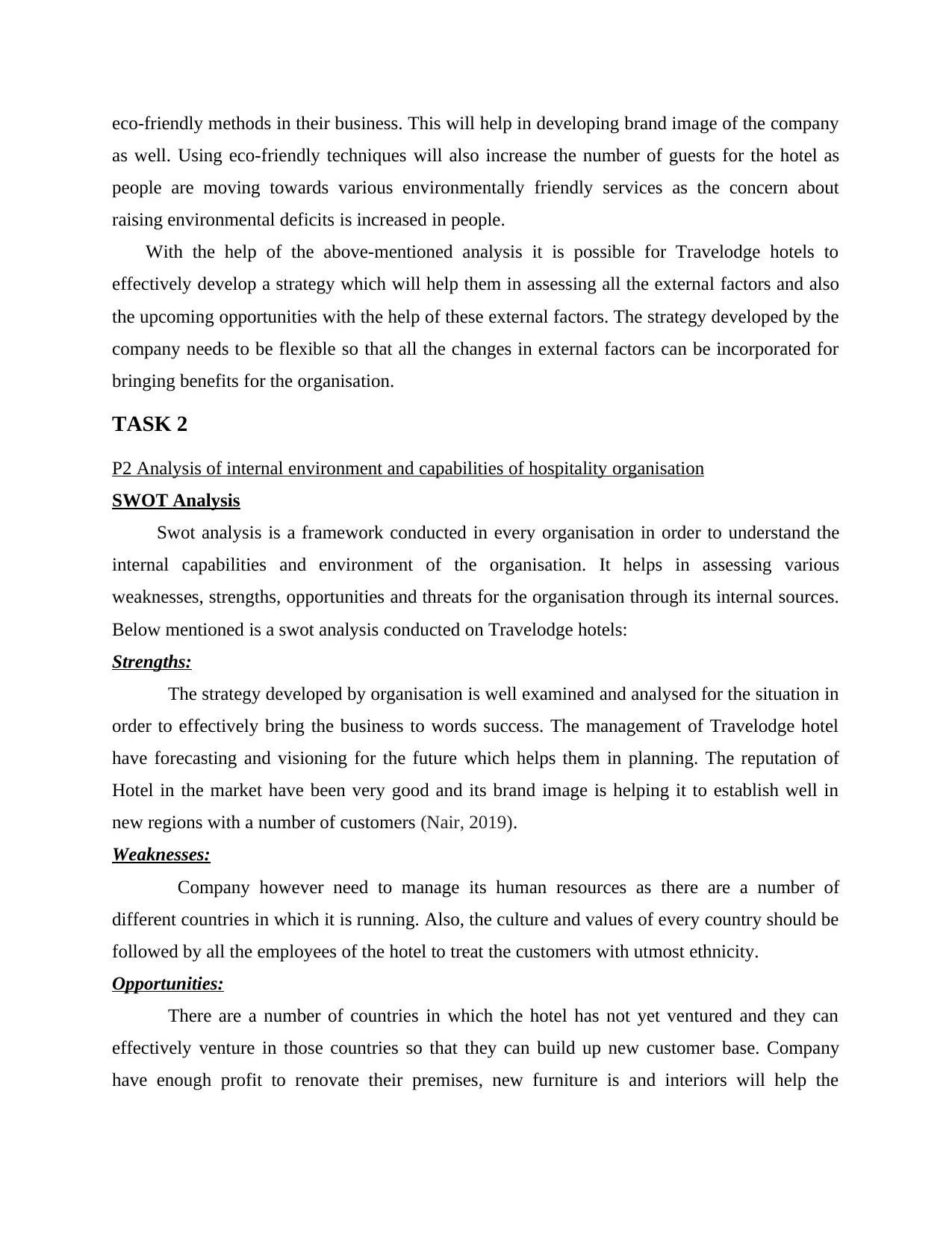
eco-friendly methods in their business. This will help in developing brand image of the company
as well. Using eco-friendly techniques will also increase the number of guests for the hotel as
people are moving towards various environmentally friendly services as the concern about
raising environmental deficits is increased in people.
With the help of the above-mentioned analysis it is possible for Travelodge hotels to
effectively develop a strategy which will help them in assessing all the external factors and also
the upcoming opportunities with the help of these external factors. The strategy developed by the
company needs to be flexible so that all the changes in external factors can be incorporated for
bringing benefits for the organisation.
TASK 2
P2 Analysis of internal environment and capabilities of hospitality organisation
SWOT Analysis
Swot analysis is a framework conducted in every organisation in order to understand the
internal capabilities and environment of the organisation. It helps in assessing various
weaknesses, strengths, opportunities and threats for the organisation through its internal sources.
Below mentioned is a swot analysis conducted on Travelodge hotels:
Strengths:
The strategy developed by organisation is well examined and analysed for the situation in
order to effectively bring the business to words success. The management of Travelodge hotel
have forecasting and visioning for the future which helps them in planning. The reputation of
Hotel in the market have been very good and its brand image is helping it to establish well in
new regions with a number of customers (Nair, 2019).
Weaknesses:
Company however need to manage its human resources as there are a number of
different countries in which it is running. Also, the culture and values of every country should be
followed by all the employees of the hotel to treat the customers with utmost ethnicity.
Opportunities:
There are a number of countries in which the hotel has not yet ventured and they can
effectively venture in those countries so that they can build up new customer base. Company
have enough profit to renovate their premises, new furniture is and interiors will help the
as well. Using eco-friendly techniques will also increase the number of guests for the hotel as
people are moving towards various environmentally friendly services as the concern about
raising environmental deficits is increased in people.
With the help of the above-mentioned analysis it is possible for Travelodge hotels to
effectively develop a strategy which will help them in assessing all the external factors and also
the upcoming opportunities with the help of these external factors. The strategy developed by the
company needs to be flexible so that all the changes in external factors can be incorporated for
bringing benefits for the organisation.
TASK 2
P2 Analysis of internal environment and capabilities of hospitality organisation
SWOT Analysis
Swot analysis is a framework conducted in every organisation in order to understand the
internal capabilities and environment of the organisation. It helps in assessing various
weaknesses, strengths, opportunities and threats for the organisation through its internal sources.
Below mentioned is a swot analysis conducted on Travelodge hotels:
Strengths:
The strategy developed by organisation is well examined and analysed for the situation in
order to effectively bring the business to words success. The management of Travelodge hotel
have forecasting and visioning for the future which helps them in planning. The reputation of
Hotel in the market have been very good and its brand image is helping it to establish well in
new regions with a number of customers (Nair, 2019).
Weaknesses:
Company however need to manage its human resources as there are a number of
different countries in which it is running. Also, the culture and values of every country should be
followed by all the employees of the hotel to treat the customers with utmost ethnicity.
Opportunities:
There are a number of countries in which the hotel has not yet ventured and they can
effectively venture in those countries so that they can build up new customer base. Company
have enough profit to renovate their premises, new furniture is and interiors will help the
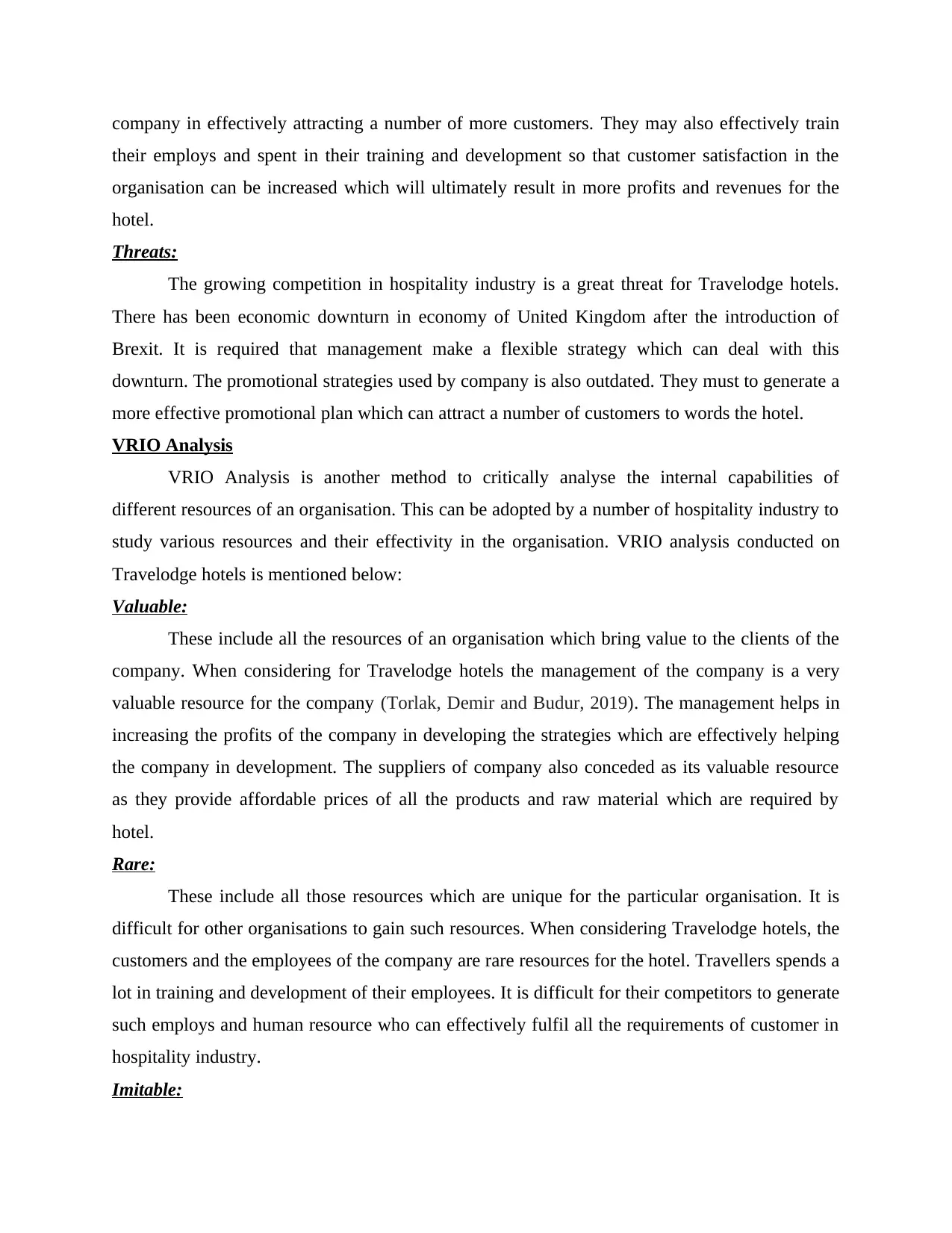
company in effectively attracting a number of more customers. They may also effectively train
their employs and spent in their training and development so that customer satisfaction in the
organisation can be increased which will ultimately result in more profits and revenues for the
hotel.
Threats:
The growing competition in hospitality industry is a great threat for Travelodge hotels.
There has been economic downturn in economy of United Kingdom after the introduction of
Brexit. It is required that management make a flexible strategy which can deal with this
downturn. The promotional strategies used by company is also outdated. They must to generate a
more effective promotional plan which can attract a number of customers to words the hotel.
VRIO Analysis
VRIO Analysis is another method to critically analyse the internal capabilities of
different resources of an organisation. This can be adopted by a number of hospitality industry to
study various resources and their effectivity in the organisation. VRIO analysis conducted on
Travelodge hotels is mentioned below:
Valuable:
These include all the resources of an organisation which bring value to the clients of the
company. When considering for Travelodge hotels the management of the company is a very
valuable resource for the company (Torlak, Demir and Budur, 2019). The management helps in
increasing the profits of the company in developing the strategies which are effectively helping
the company in development. The suppliers of company also conceded as its valuable resource
as they provide affordable prices of all the products and raw material which are required by
hotel.
Rare:
These include all those resources which are unique for the particular organisation. It is
difficult for other organisations to gain such resources. When considering Travelodge hotels, the
customers and the employees of the company are rare resources for the hotel. Travellers spends a
lot in training and development of their employees. It is difficult for their competitors to generate
such employs and human resource who can effectively fulfil all the requirements of customer in
hospitality industry.
Imitable:
their employs and spent in their training and development so that customer satisfaction in the
organisation can be increased which will ultimately result in more profits and revenues for the
hotel.
Threats:
The growing competition in hospitality industry is a great threat for Travelodge hotels.
There has been economic downturn in economy of United Kingdom after the introduction of
Brexit. It is required that management make a flexible strategy which can deal with this
downturn. The promotional strategies used by company is also outdated. They must to generate a
more effective promotional plan which can attract a number of customers to words the hotel.
VRIO Analysis
VRIO Analysis is another method to critically analyse the internal capabilities of
different resources of an organisation. This can be adopted by a number of hospitality industry to
study various resources and their effectivity in the organisation. VRIO analysis conducted on
Travelodge hotels is mentioned below:
Valuable:
These include all the resources of an organisation which bring value to the clients of the
company. When considering for Travelodge hotels the management of the company is a very
valuable resource for the company (Torlak, Demir and Budur, 2019). The management helps in
increasing the profits of the company in developing the strategies which are effectively helping
the company in development. The suppliers of company also conceded as its valuable resource
as they provide affordable prices of all the products and raw material which are required by
hotel.
Rare:
These include all those resources which are unique for the particular organisation. It is
difficult for other organisations to gain such resources. When considering Travelodge hotels, the
customers and the employees of the company are rare resources for the hotel. Travellers spends a
lot in training and development of their employees. It is difficult for their competitors to generate
such employs and human resource who can effectively fulfil all the requirements of customer in
hospitality industry.
Imitable:
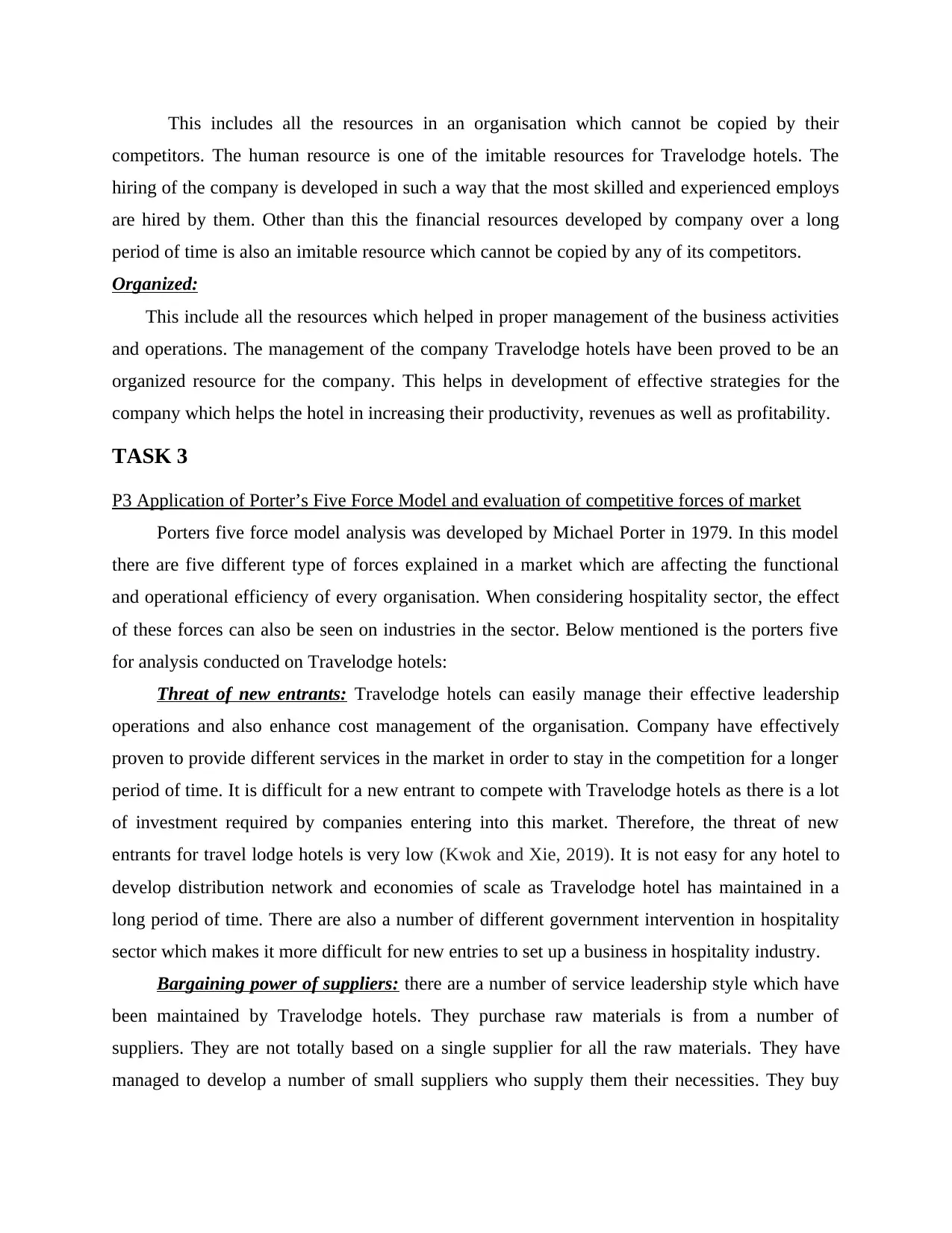
This includes all the resources in an organisation which cannot be copied by their
competitors. The human resource is one of the imitable resources for Travelodge hotels. The
hiring of the company is developed in such a way that the most skilled and experienced employs
are hired by them. Other than this the financial resources developed by company over a long
period of time is also an imitable resource which cannot be copied by any of its competitors.
Organized:
This include all the resources which helped in proper management of the business activities
and operations. The management of the company Travelodge hotels have been proved to be an
organized resource for the company. This helps in development of effective strategies for the
company which helps the hotel in increasing their productivity, revenues as well as profitability.
TASK 3
P3 Application of Porter’s Five Force Model and evaluation of competitive forces of market
Porters five force model analysis was developed by Michael Porter in 1979. In this model
there are five different type of forces explained in a market which are affecting the functional
and operational efficiency of every organisation. When considering hospitality sector, the effect
of these forces can also be seen on industries in the sector. Below mentioned is the porters five
for analysis conducted on Travelodge hotels:
Threat of new entrants: Travelodge hotels can easily manage their effective leadership
operations and also enhance cost management of the organisation. Company have effectively
proven to provide different services in the market in order to stay in the competition for a longer
period of time. It is difficult for a new entrant to compete with Travelodge hotels as there is a lot
of investment required by companies entering into this market. Therefore, the threat of new
entrants for travel lodge hotels is very low (Kwok and Xie, 2019). It is not easy for any hotel to
develop distribution network and economies of scale as Travelodge hotel has maintained in a
long period of time. There are also a number of different government intervention in hospitality
sector which makes it more difficult for new entries to set up a business in hospitality industry.
Bargaining power of suppliers: there are a number of service leadership style which have
been maintained by Travelodge hotels. They purchase raw materials is from a number of
suppliers. They are not totally based on a single supplier for all the raw materials. They have
managed to develop a number of small suppliers who supply them their necessities. They buy
competitors. The human resource is one of the imitable resources for Travelodge hotels. The
hiring of the company is developed in such a way that the most skilled and experienced employs
are hired by them. Other than this the financial resources developed by company over a long
period of time is also an imitable resource which cannot be copied by any of its competitors.
Organized:
This include all the resources which helped in proper management of the business activities
and operations. The management of the company Travelodge hotels have been proved to be an
organized resource for the company. This helps in development of effective strategies for the
company which helps the hotel in increasing their productivity, revenues as well as profitability.
TASK 3
P3 Application of Porter’s Five Force Model and evaluation of competitive forces of market
Porters five force model analysis was developed by Michael Porter in 1979. In this model
there are five different type of forces explained in a market which are affecting the functional
and operational efficiency of every organisation. When considering hospitality sector, the effect
of these forces can also be seen on industries in the sector. Below mentioned is the porters five
for analysis conducted on Travelodge hotels:
Threat of new entrants: Travelodge hotels can easily manage their effective leadership
operations and also enhance cost management of the organisation. Company have effectively
proven to provide different services in the market in order to stay in the competition for a longer
period of time. It is difficult for a new entrant to compete with Travelodge hotels as there is a lot
of investment required by companies entering into this market. Therefore, the threat of new
entrants for travel lodge hotels is very low (Kwok and Xie, 2019). It is not easy for any hotel to
develop distribution network and economies of scale as Travelodge hotel has maintained in a
long period of time. There are also a number of different government intervention in hospitality
sector which makes it more difficult for new entries to set up a business in hospitality industry.
Bargaining power of suppliers: there are a number of service leadership style which have
been maintained by Travelodge hotels. They purchase raw materials is from a number of
suppliers. They are not totally based on a single supplier for all the raw materials. They have
managed to develop a number of small suppliers who supply them their necessities. They buy
Paraphrase This Document
Need a fresh take? Get an instant paraphrase of this document with our AI Paraphraser
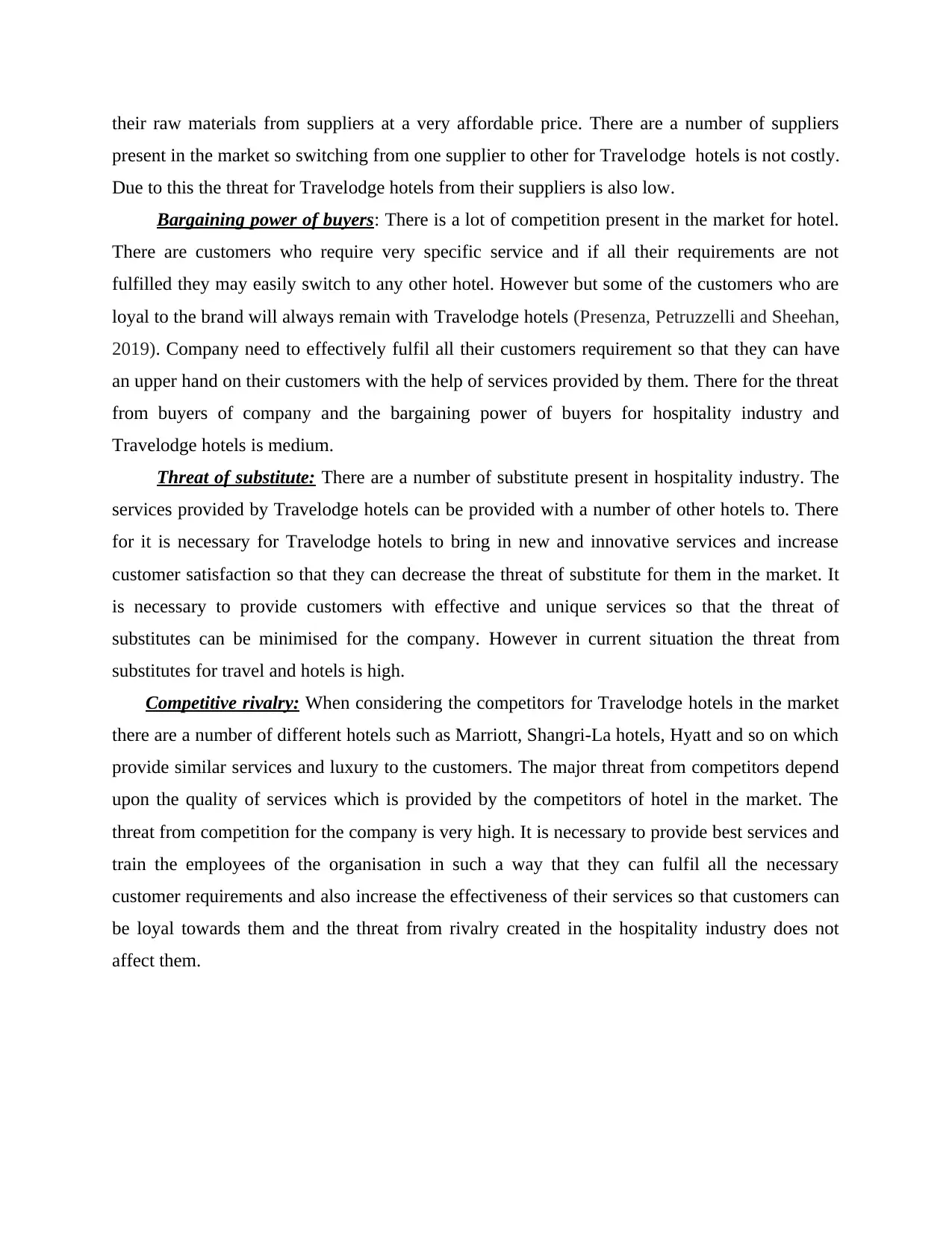
their raw materials from suppliers at a very affordable price. There are a number of suppliers
present in the market so switching from one supplier to other for Travelodge hotels is not costly.
Due to this the threat for Travelodge hotels from their suppliers is also low.
Bargaining power of buyers: There is a lot of competition present in the market for hotel.
There are customers who require very specific service and if all their requirements are not
fulfilled they may easily switch to any other hotel. However but some of the customers who are
loyal to the brand will always remain with Travelodge hotels (Presenza, Petruzzelli and Sheehan,
2019). Company need to effectively fulfil all their customers requirement so that they can have
an upper hand on their customers with the help of services provided by them. There for the threat
from buyers of company and the bargaining power of buyers for hospitality industry and
Travelodge hotels is medium.
Threat of substitute: There are a number of substitute present in hospitality industry. The
services provided by Travelodge hotels can be provided with a number of other hotels to. There
for it is necessary for Travelodge hotels to bring in new and innovative services and increase
customer satisfaction so that they can decrease the threat of substitute for them in the market. It
is necessary to provide customers with effective and unique services so that the threat of
substitutes can be minimised for the company. However in current situation the threat from
substitutes for travel and hotels is high.
Competitive rivalry: When considering the competitors for Travelodge hotels in the market
there are a number of different hotels such as Marriott, Shangri-La hotels, Hyatt and so on which
provide similar services and luxury to the customers. The major threat from competitors depend
upon the quality of services which is provided by the competitors of hotel in the market. The
threat from competition for the company is very high. It is necessary to provide best services and
train the employees of the organisation in such a way that they can fulfil all the necessary
customer requirements and also increase the effectiveness of their services so that customers can
be loyal towards them and the threat from rivalry created in the hospitality industry does not
affect them.
present in the market so switching from one supplier to other for Travelodge hotels is not costly.
Due to this the threat for Travelodge hotels from their suppliers is also low.
Bargaining power of buyers: There is a lot of competition present in the market for hotel.
There are customers who require very specific service and if all their requirements are not
fulfilled they may easily switch to any other hotel. However but some of the customers who are
loyal to the brand will always remain with Travelodge hotels (Presenza, Petruzzelli and Sheehan,
2019). Company need to effectively fulfil all their customers requirement so that they can have
an upper hand on their customers with the help of services provided by them. There for the threat
from buyers of company and the bargaining power of buyers for hospitality industry and
Travelodge hotels is medium.
Threat of substitute: There are a number of substitute present in hospitality industry. The
services provided by Travelodge hotels can be provided with a number of other hotels to. There
for it is necessary for Travelodge hotels to bring in new and innovative services and increase
customer satisfaction so that they can decrease the threat of substitute for them in the market. It
is necessary to provide customers with effective and unique services so that the threat of
substitutes can be minimised for the company. However in current situation the threat from
substitutes for travel and hotels is high.
Competitive rivalry: When considering the competitors for Travelodge hotels in the market
there are a number of different hotels such as Marriott, Shangri-La hotels, Hyatt and so on which
provide similar services and luxury to the customers. The major threat from competitors depend
upon the quality of services which is provided by the competitors of hotel in the market. The
threat from competition for the company is very high. It is necessary to provide best services and
train the employees of the organisation in such a way that they can fulfil all the necessary
customer requirements and also increase the effectiveness of their services so that customers can
be loyal towards them and the threat from rivalry created in the hospitality industry does not
affect them.
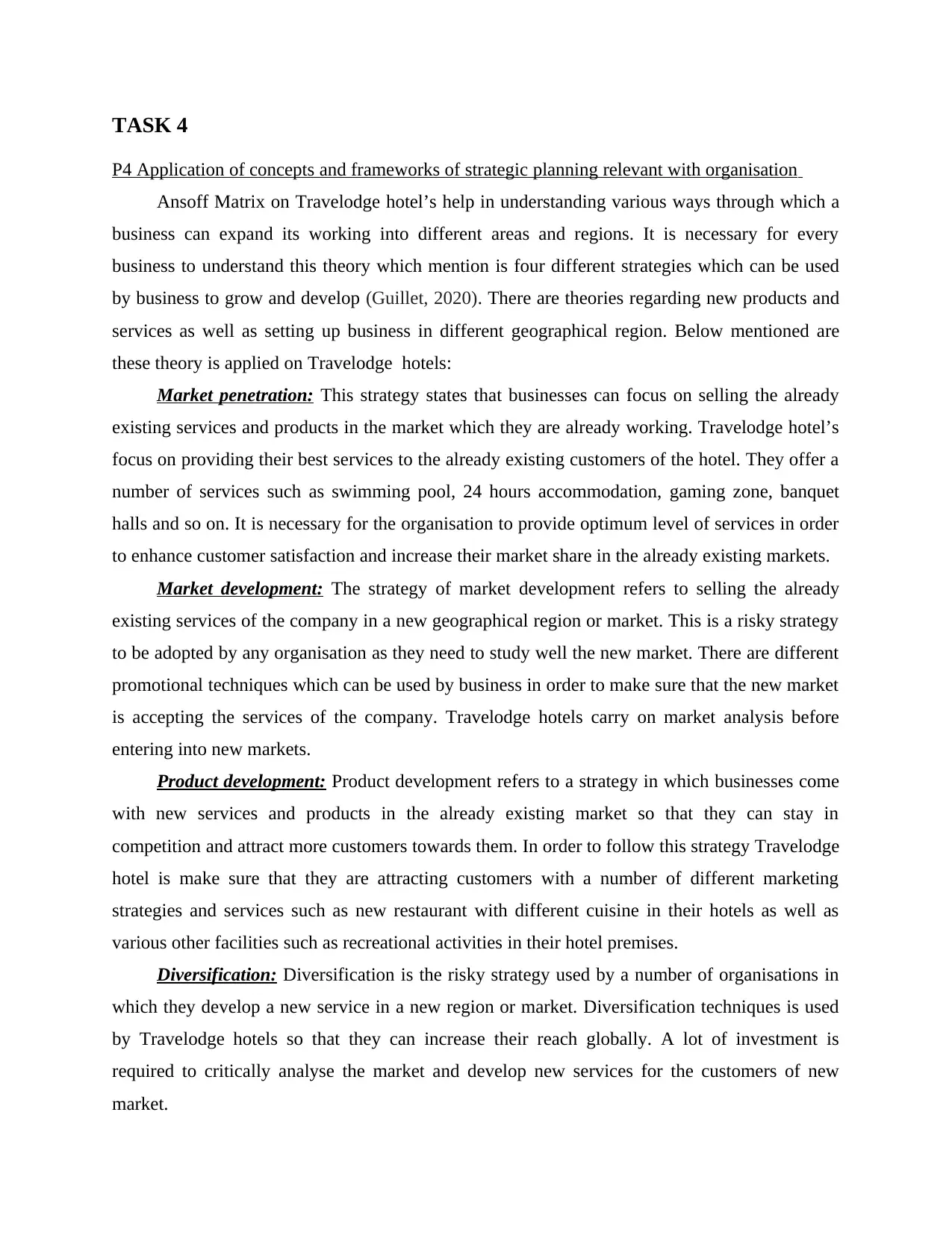
TASK 4
P4 Application of concepts and frameworks of strategic planning relevant with organisation
Ansoff Matrix on Travelodge hotel’s help in understanding various ways through which a
business can expand its working into different areas and regions. It is necessary for every
business to understand this theory which mention is four different strategies which can be used
by business to grow and develop (Guillet, 2020). There are theories regarding new products and
services as well as setting up business in different geographical region. Below mentioned are
these theory is applied on Travelodge hotels:
Market penetration: This strategy states that businesses can focus on selling the already
existing services and products in the market which they are already working. Travelodge hotel’s
focus on providing their best services to the already existing customers of the hotel. They offer a
number of services such as swimming pool, 24 hours accommodation, gaming zone, banquet
halls and so on. It is necessary for the organisation to provide optimum level of services in order
to enhance customer satisfaction and increase their market share in the already existing markets.
Market development: The strategy of market development refers to selling the already
existing services of the company in a new geographical region or market. This is a risky strategy
to be adopted by any organisation as they need to study well the new market. There are different
promotional techniques which can be used by business in order to make sure that the new market
is accepting the services of the company. Travelodge hotels carry on market analysis before
entering into new markets.
Product development: Product development refers to a strategy in which businesses come
with new services and products in the already existing market so that they can stay in
competition and attract more customers towards them. In order to follow this strategy Travelodge
hotel is make sure that they are attracting customers with a number of different marketing
strategies and services such as new restaurant with different cuisine in their hotels as well as
various other facilities such as recreational activities in their hotel premises.
Diversification: Diversification is the risky strategy used by a number of organisations in
which they develop a new service in a new region or market. Diversification techniques is used
by Travelodge hotels so that they can increase their reach globally. A lot of investment is
required to critically analyse the market and develop new services for the customers of new
market.
P4 Application of concepts and frameworks of strategic planning relevant with organisation
Ansoff Matrix on Travelodge hotel’s help in understanding various ways through which a
business can expand its working into different areas and regions. It is necessary for every
business to understand this theory which mention is four different strategies which can be used
by business to grow and develop (Guillet, 2020). There are theories regarding new products and
services as well as setting up business in different geographical region. Below mentioned are
these theory is applied on Travelodge hotels:
Market penetration: This strategy states that businesses can focus on selling the already
existing services and products in the market which they are already working. Travelodge hotel’s
focus on providing their best services to the already existing customers of the hotel. They offer a
number of services such as swimming pool, 24 hours accommodation, gaming zone, banquet
halls and so on. It is necessary for the organisation to provide optimum level of services in order
to enhance customer satisfaction and increase their market share in the already existing markets.
Market development: The strategy of market development refers to selling the already
existing services of the company in a new geographical region or market. This is a risky strategy
to be adopted by any organisation as they need to study well the new market. There are different
promotional techniques which can be used by business in order to make sure that the new market
is accepting the services of the company. Travelodge hotels carry on market analysis before
entering into new markets.
Product development: Product development refers to a strategy in which businesses come
with new services and products in the already existing market so that they can stay in
competition and attract more customers towards them. In order to follow this strategy Travelodge
hotel is make sure that they are attracting customers with a number of different marketing
strategies and services such as new restaurant with different cuisine in their hotels as well as
various other facilities such as recreational activities in their hotel premises.
Diversification: Diversification is the risky strategy used by a number of organisations in
which they develop a new service in a new region or market. Diversification techniques is used
by Travelodge hotels so that they can increase their reach globally. A lot of investment is
required to critically analyse the market and develop new services for the customers of new
market.
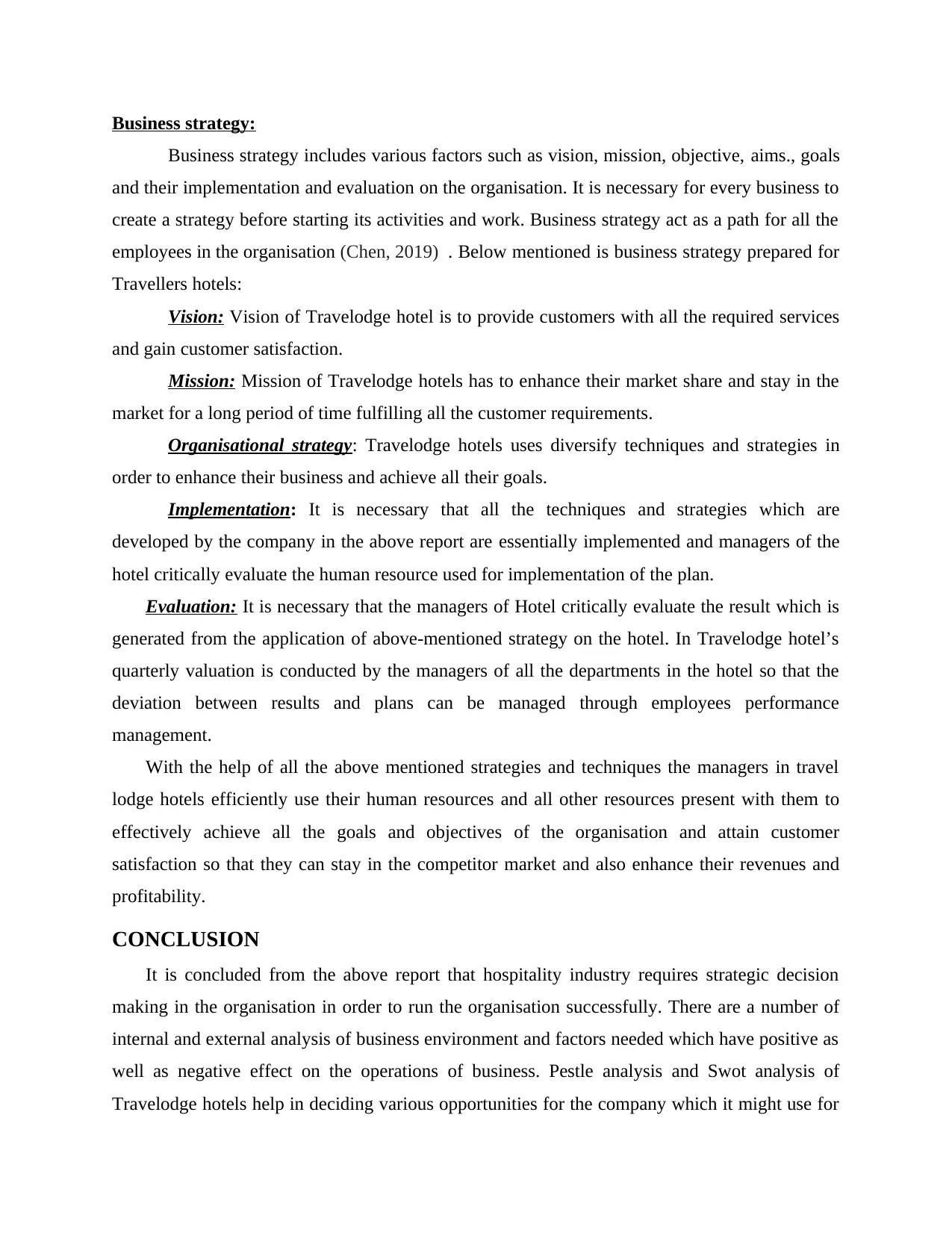
Business strategy:
Business strategy includes various factors such as vision, mission, objective, aims., goals
and their implementation and evaluation on the organisation. It is necessary for every business to
create a strategy before starting its activities and work. Business strategy act as a path for all the
employees in the organisation (Chen, 2019) . Below mentioned is business strategy prepared for
Travellers hotels:
Vision: Vision of Travelodge hotel is to provide customers with all the required services
and gain customer satisfaction.
Mission: Mission of Travelodge hotels has to enhance their market share and stay in the
market for a long period of time fulfilling all the customer requirements.
Organisational strategy: Travelodge hotels uses diversify techniques and strategies in
order to enhance their business and achieve all their goals.
Implementation: It is necessary that all the techniques and strategies which are
developed by the company in the above report are essentially implemented and managers of the
hotel critically evaluate the human resource used for implementation of the plan.
Evaluation: It is necessary that the managers of Hotel critically evaluate the result which is
generated from the application of above-mentioned strategy on the hotel. In Travelodge hotel’s
quarterly valuation is conducted by the managers of all the departments in the hotel so that the
deviation between results and plans can be managed through employees performance
management.
With the help of all the above mentioned strategies and techniques the managers in travel
lodge hotels efficiently use their human resources and all other resources present with them to
effectively achieve all the goals and objectives of the organisation and attain customer
satisfaction so that they can stay in the competitor market and also enhance their revenues and
profitability.
CONCLUSION
It is concluded from the above report that hospitality industry requires strategic decision
making in the organisation in order to run the organisation successfully. There are a number of
internal and external analysis of business environment and factors needed which have positive as
well as negative effect on the operations of business. Pestle analysis and Swot analysis of
Travelodge hotels help in deciding various opportunities for the company which it might use for
Business strategy includes various factors such as vision, mission, objective, aims., goals
and their implementation and evaluation on the organisation. It is necessary for every business to
create a strategy before starting its activities and work. Business strategy act as a path for all the
employees in the organisation (Chen, 2019) . Below mentioned is business strategy prepared for
Travellers hotels:
Vision: Vision of Travelodge hotel is to provide customers with all the required services
and gain customer satisfaction.
Mission: Mission of Travelodge hotels has to enhance their market share and stay in the
market for a long period of time fulfilling all the customer requirements.
Organisational strategy: Travelodge hotels uses diversify techniques and strategies in
order to enhance their business and achieve all their goals.
Implementation: It is necessary that all the techniques and strategies which are
developed by the company in the above report are essentially implemented and managers of the
hotel critically evaluate the human resource used for implementation of the plan.
Evaluation: It is necessary that the managers of Hotel critically evaluate the result which is
generated from the application of above-mentioned strategy on the hotel. In Travelodge hotel’s
quarterly valuation is conducted by the managers of all the departments in the hotel so that the
deviation between results and plans can be managed through employees performance
management.
With the help of all the above mentioned strategies and techniques the managers in travel
lodge hotels efficiently use their human resources and all other resources present with them to
effectively achieve all the goals and objectives of the organisation and attain customer
satisfaction so that they can stay in the competitor market and also enhance their revenues and
profitability.
CONCLUSION
It is concluded from the above report that hospitality industry requires strategic decision
making in the organisation in order to run the organisation successfully. There are a number of
internal and external analysis of business environment and factors needed which have positive as
well as negative effect on the operations of business. Pestle analysis and Swot analysis of
Travelodge hotels help in deciding various opportunities for the company which it might use for
Secure Best Marks with AI Grader
Need help grading? Try our AI Grader for instant feedback on your assignments.
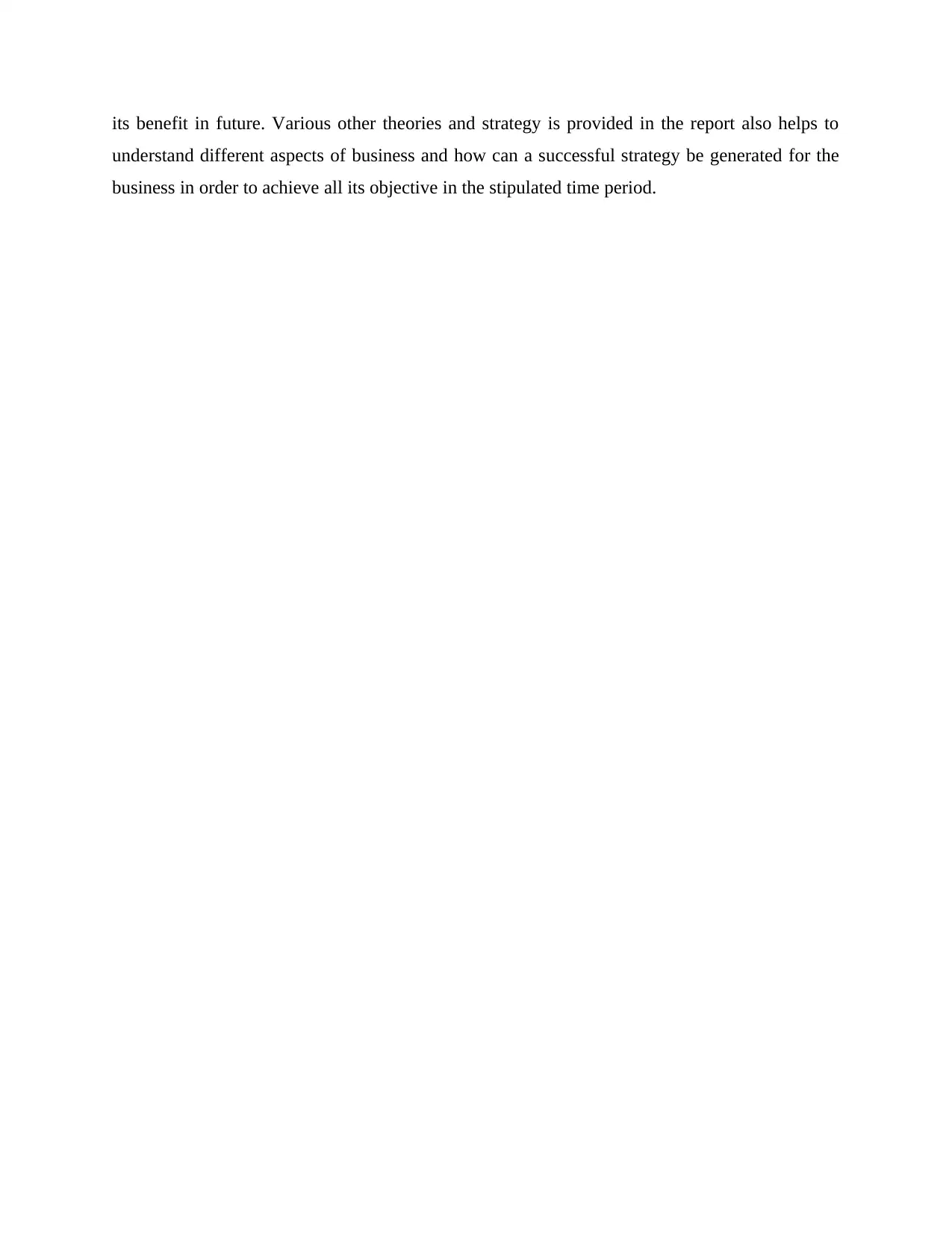
its benefit in future. Various other theories and strategy is provided in the report also helps to
understand different aspects of business and how can a successful strategy be generated for the
business in order to achieve all its objective in the stipulated time period.
understand different aspects of business and how can a successful strategy be generated for the
business in order to achieve all its objective in the stipulated time period.
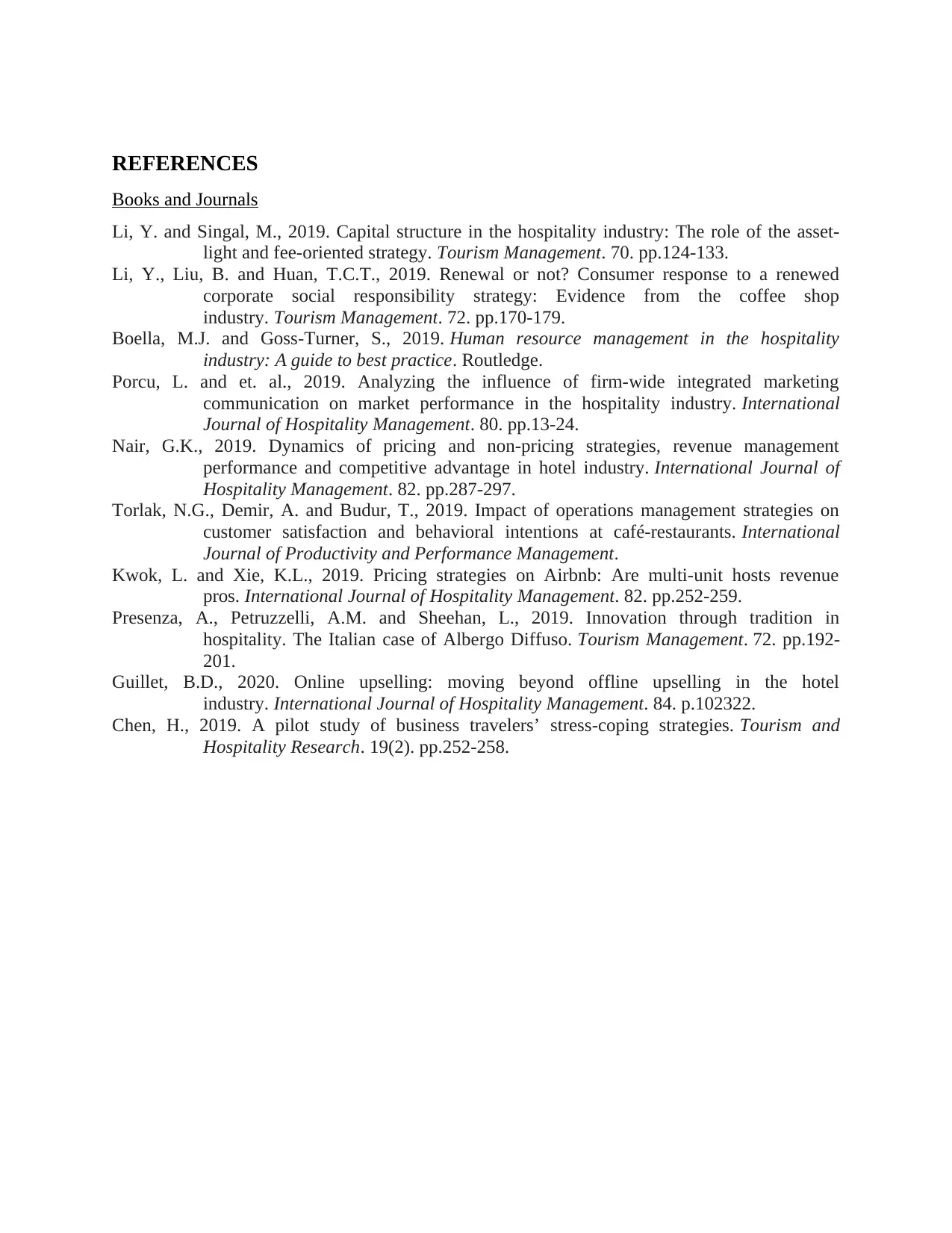
REFERENCES
Books and Journals
Li, Y. and Singal, M., 2019. Capital structure in the hospitality industry: The role of the asset-
light and fee-oriented strategy. Tourism Management. 70. pp.124-133.
Li, Y., Liu, B. and Huan, T.C.T., 2019. Renewal or not? Consumer response to a renewed
corporate social responsibility strategy: Evidence from the coffee shop
industry. Tourism Management. 72. pp.170-179.
Boella, M.J. and Goss-Turner, S., 2019. Human resource management in the hospitality
industry: A guide to best practice. Routledge.
Porcu, L. and et. al., 2019. Analyzing the influence of firm-wide integrated marketing
communication on market performance in the hospitality industry. International
Journal of Hospitality Management. 80. pp.13-24.
Nair, G.K., 2019. Dynamics of pricing and non-pricing strategies, revenue management
performance and competitive advantage in hotel industry. International Journal of
Hospitality Management. 82. pp.287-297.
Torlak, N.G., Demir, A. and Budur, T., 2019. Impact of operations management strategies on
customer satisfaction and behavioral intentions at café-restaurants. International
Journal of Productivity and Performance Management.
Kwok, L. and Xie, K.L., 2019. Pricing strategies on Airbnb: Are multi-unit hosts revenue
pros. International Journal of Hospitality Management. 82. pp.252-259.
Presenza, A., Petruzzelli, A.M. and Sheehan, L., 2019. Innovation through tradition in
hospitality. The Italian case of Albergo Diffuso. Tourism Management. 72. pp.192-
201.
Guillet, B.D., 2020. Online upselling: moving beyond offline upselling in the hotel
industry. International Journal of Hospitality Management. 84. p.102322.
Chen, H., 2019. A pilot study of business travelers’ stress-coping strategies. Tourism and
Hospitality Research. 19(2). pp.252-258.
Books and Journals
Li, Y. and Singal, M., 2019. Capital structure in the hospitality industry: The role of the asset-
light and fee-oriented strategy. Tourism Management. 70. pp.124-133.
Li, Y., Liu, B. and Huan, T.C.T., 2019. Renewal or not? Consumer response to a renewed
corporate social responsibility strategy: Evidence from the coffee shop
industry. Tourism Management. 72. pp.170-179.
Boella, M.J. and Goss-Turner, S., 2019. Human resource management in the hospitality
industry: A guide to best practice. Routledge.
Porcu, L. and et. al., 2019. Analyzing the influence of firm-wide integrated marketing
communication on market performance in the hospitality industry. International
Journal of Hospitality Management. 80. pp.13-24.
Nair, G.K., 2019. Dynamics of pricing and non-pricing strategies, revenue management
performance and competitive advantage in hotel industry. International Journal of
Hospitality Management. 82. pp.287-297.
Torlak, N.G., Demir, A. and Budur, T., 2019. Impact of operations management strategies on
customer satisfaction and behavioral intentions at café-restaurants. International
Journal of Productivity and Performance Management.
Kwok, L. and Xie, K.L., 2019. Pricing strategies on Airbnb: Are multi-unit hosts revenue
pros. International Journal of Hospitality Management. 82. pp.252-259.
Presenza, A., Petruzzelli, A.M. and Sheehan, L., 2019. Innovation through tradition in
hospitality. The Italian case of Albergo Diffuso. Tourism Management. 72. pp.192-
201.
Guillet, B.D., 2020. Online upselling: moving beyond offline upselling in the hotel
industry. International Journal of Hospitality Management. 84. p.102322.
Chen, H., 2019. A pilot study of business travelers’ stress-coping strategies. Tourism and
Hospitality Research. 19(2). pp.252-258.
1 out of 12
Related Documents
Your All-in-One AI-Powered Toolkit for Academic Success.
+13062052269
info@desklib.com
Available 24*7 on WhatsApp / Email
![[object Object]](/_next/static/media/star-bottom.7253800d.svg)
Unlock your academic potential
© 2024 | Zucol Services PVT LTD | All rights reserved.




